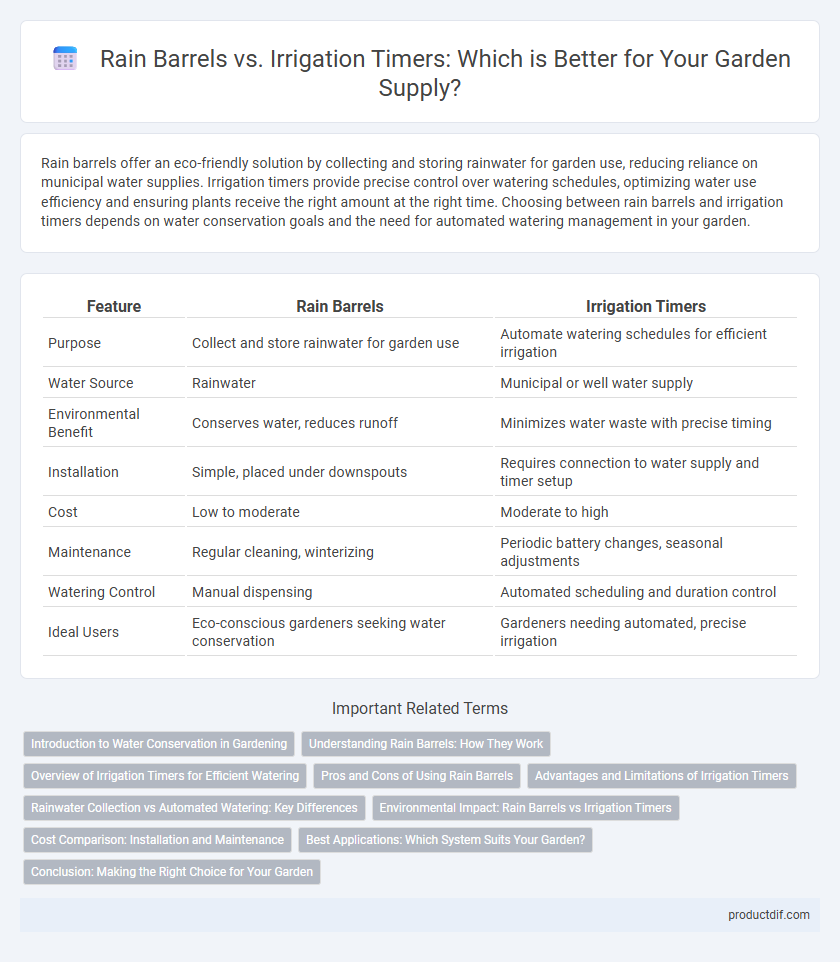Rain barrels offer an eco-friendly solution by collecting and storing rainwater for garden use, reducing reliance on municipal water supplies. Irrigation timers provide precise control over watering schedules, optimizing water use efficiency and ensuring plants receive the right amount at the right time. Choosing between rain barrels and irrigation timers depends on water conservation goals and the need for automated watering management in your garden.
Table of Comparison
| Feature | Rain Barrels | Irrigation Timers |
|---|---|---|
| Purpose | Collect and store rainwater for garden use | Automate watering schedules for efficient irrigation |
| Water Source | Rainwater | Municipal or well water supply |
| Environmental Benefit | Conserves water, reduces runoff | Minimizes water waste with precise timing |
| Installation | Simple, placed under downspouts | Requires connection to water supply and timer setup |
| Cost | Low to moderate | Moderate to high |
| Maintenance | Regular cleaning, winterizing | Periodic battery changes, seasonal adjustments |
| Watering Control | Manual dispensing | Automated scheduling and duration control |
| Ideal Users | Eco-conscious gardeners seeking water conservation | Gardeners needing automated, precise irrigation |
Introduction to Water Conservation in Gardening
Rain barrels capture and store rainwater, providing a sustainable source for garden use and reducing reliance on municipal water. Irrigation timers automate watering schedules, ensuring plants receive precise amounts of water at optimal times, minimizing waste. Combining these tools enhances water conservation efforts by efficiently managing natural and supplemental water sources.
Understanding Rain Barrels: How They Work
Rain barrels collect and store rainwater from rooftops, providing an eco-friendly water source for garden irrigation that reduces reliance on municipal water. These barrels feature a spigot at the bottom for easy access to the stored water, while overflow outlets prevent excess water from causing damage during heavy rainfall. Using rain barrels conserves water, lowers utility bills, and supports sustainable gardening practices by capturing and utilizing rainwater efficiently.
Overview of Irrigation Timers for Efficient Watering
Irrigation timers automate watering schedules to optimize garden hydration by delivering precise water amounts at set intervals, reducing water waste and promoting healthier plant growth. These devices can be programmed for specific durations and frequencies, ensuring consistent moisture levels tailored to different plant needs and seasonal changes. Efficient irrigation timers contribute to water conservation efforts and help maintain sustainable garden practices by minimizing overwatering and runoff.
Pros and Cons of Using Rain Barrels
Rain barrels provide a sustainable water source by collecting and storing rainwater, reducing reliance on municipal water and lowering utility bills. They offer an eco-friendly method for garden irrigation but require regular maintenance to prevent algae growth and mosquito breeding. However, rain barrels have limited capacity and may not supply enough water during extended dry periods compared to irrigation timers connected to a consistent water supply.
Advantages and Limitations of Irrigation Timers
Irrigation timers offer precise control over watering schedules, ensuring plants receive consistent moisture while conserving water by preventing overwatering. These devices can be programmed to accommodate plant-specific needs and varying weather conditions, enhancing garden health and reducing water bills. However, irrigation timers rely on a stable power source and may require regular maintenance or calibration to function optimally, posing challenges in remote or off-grid garden setups.
Rainwater Collection vs Automated Watering: Key Differences
Rain barrels collect and store rainwater for garden use, promoting sustainable water conservation and reducing utility bills by utilizing natural rainfall. Irrigation timers automate watering schedules, ensuring consistent moisture levels and optimizing water usage through precise control of irrigation systems. While rain barrels emphasize resource collection, irrigation timers focus on efficient, scheduled distribution of water to plants.
Environmental Impact: Rain Barrels vs Irrigation Timers
Rain barrels conserve water by collecting and storing rainfall, reducing reliance on municipal water supplies and lowering runoff pollution in urban areas. Irrigation timers optimize water usage by scheduling precise watering times and durations, minimizing water waste and promoting plant health. Both methods contribute to sustainable gardening, but rain barrels directly capture natural water resources, enhancing environmental benefits through stormwater management.
Cost Comparison: Installation and Maintenance
Rain barrels offer a low-cost installation, typically priced between $50 and $150, with minimal maintenance costs primarily involving periodic cleaning to prevent algae buildup. Irrigation timers have a higher initial investment, ranging from $70 to $300 depending on features and complexity, and require ongoing maintenance for sensor calibration and battery replacement. While rain barrels reduce water bills by collecting rainwater, irrigation timers optimize water use efficiency, potentially lowering overall water consumption costs.
Best Applications: Which System Suits Your Garden?
Rain barrels are ideal for gardens in regions with regular rainfall, providing a sustainable water source for drought-tolerant plants and reducing water bills. Irrigation timers suit larger or vegetable gardens with diverse watering needs, ensuring precise, automated watering schedules that promote consistent plant health. Combining both systems can optimize water efficiency by capturing rainwater and delivering it systematically for various plant types and garden sizes.
Conclusion: Making the Right Choice for Your Garden
Rain barrels provide an eco-friendly way to collect and store natural rainfall, reducing water bills and supporting sustainable gardening. Irrigation timers offer precise control over watering schedules, promoting efficient water use and healthier plant growth through automated management. Choosing between rain barrels and irrigation timers depends on your garden's water availability, budget, and maintenance preferences to optimize both resource efficiency and plant health.
Rain Barrels vs Irrigation Timers Infographic

 productdif.com
productdif.com